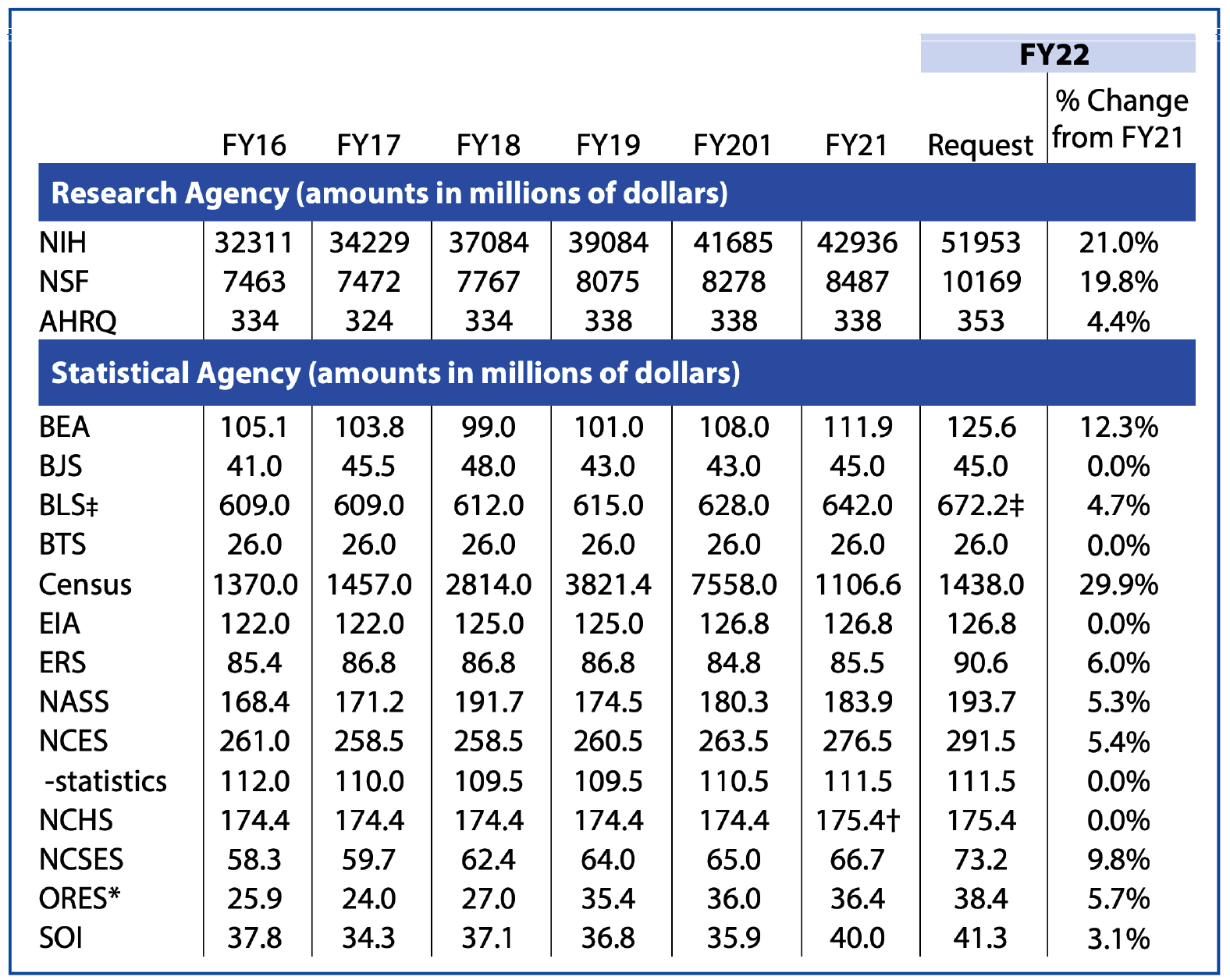Biden Administration’s First Budget Request Favors NIH, NSF; Flat Funds Education, Energy, Health, Justice Statistics
Steve Pierson, ASA Director of Science Policy
The Biden administration’s fiscal year 2022 (FY22) budget request sends a strong signal for its support of research funding, proposing 20 percent increases for the National Institutes of Health (NIH) and National Science Foundation (NSF). Many of the federal statistical agencies also see strong support through increases of 5–10 percent, as shown in Table 1. However, the FY22 request, released in detail in late May, flat funds the Bureau of Justice Statistics (BJS), Energy Information Administration (EIA), National Center for Health Statistics (NCHS), and the statistics account for the National Center for Education Statistics (NCES).

Table 1—FY16–FY21 Budgets and FY22 Requests for NIH, NSF, AHRQ, and the 13 Principal Federal Statistical Agencies (Click to Enlarge)
*The ORES budget increase from FY18 to FY19 is partially explained by the merging of the Office of Retirement Policy (ORP) into ORES. The FY18 ORP budget was $2.3M.
†The NCHS budget was restructured starting in FY21 to account for $14 million previously routinely received from another account. The prior year budgets were adjusted to make them comparable.
‡The BLS request includes another $28 million for its relocation to Suitland, MD, to share facilities with BEA and the US Census Bureau.
With Congress beginning to release its FY22 budgets this summer, this piece will briefly summarize the high points of the requests for the three research funding agencies and 13 principal federal statistical agencies.
The proposed increases for NSF and NIH are part of initiatives to help “spur innovation across the economy and renew America’s global leadership” and to “build on efforts to combat the COVID-19 pandemic and improve the public health infrastructure,” according to the budget request.
Two-thirds of the $9 billion increase for NIH is to establish the Advanced Research Projects Agency for Health, the purpose for which, according to the request, is to “drive transformational innovation in health research and speed application and implementation of health breakthroughs.”
The $1.7 billion requested increase for NSF is intended to fund research across NSF’s portfolio and “improve equity in science and engineering, advance climate science and sustainability research, [and] continue construction of forefront research infrastructure,” according to the NSF’s budget request to Congress.
The $15 million increase for the Agency for Healthcare Research and Quality (AHRQ) is to be allocated almost equally for research on integrated treatment for opioid and multiple substance abuse disorders in ambulatory care settings and for its initiative to improve maternal health.
The 12 percent increase for the Bureau of Economic Analysis (BEA), which also includes operations for the Office of the Under Secretary for Economic Affairs (OUSEA), is to ensure “the Department of Commerce remains a leader across government in data innovation and the implementation of the Evidence Act,” according to the congressional justification (CJ). It includes $2 million for implementation of the Evidence Act and $7 million to develop a federal data service under OUSEA. The increase would also support such programs as GDP by County and Consumer Spending by State and BEA’s international accounts.
The administration requests a $30 million increase for Bureau of Labor Statistics (BLS) programs and $28 million for the agency’s relocation to the site of BEA and the US Census Bureau in Suitland, Maryland. The program increase, according to the agency CJ, seems to address the BLS’s 12 percent loss of purchasing power since FY09. It specifies $13 million for “pay and benefit related built-ins” and other pay-related increases. $10 million is “to rebuild statistical capacity across the agency,” noting “staffing levels have eroded due to significant unfunded mandates that have had to be absorbed through staff reductions” and stating the restoration of staffing levels “are critical toward supporting the Administration’s priorities of advancing scientific integrity and evidence-based policymaking.” The request also includes funds to reduce the current lag in the publication of the chained Consumer Price Index by three months.
The $5 million for the Economic Research Service (ERS) is largely to “expand the modeling, data, and analysis related to the intersection between climate change and agriculture sector.” The CJ also reports that that the agency has 229 full-time employees, 90 located in DC and 139 at its Kansas City, Missouri, field office. This number shows significant progress in ERS’s efforts to rebuild its staff levels to the 325 it had before its abrupt relocation in 2019.
For the National Agricultural Statistics Service (NASS), the $10 million increase also largely funds climate change work, through expansion of its existing geospatial program informing the impact of extreme weather events and establishment of baseline data for climate change tracking. Additionally, the request includes funding for the quinquennial Census of Agriculture and proposes elimination of the Local Food Marketing Practices Survey.
The $15 million requested increase for NCES, according to the CJ, “would help maintain the assessment schedule as well as help allow initial research and development investments to improve assessment quality while reducing future program costs.”
The $6 million increase for the National Center for Science and Engineering Statistics (NCSES) supports the creation of America’s DataHub, a research center to securely share and link existing data to solve complex problems and improve the data and informational infrastructure around understanding racial equity and participation, among numerous other activities.
According to the director of the IRS Statistics of Income (SOI) Division, its 3 percent increase should allow the agency to meet critical hiring needs.
Details for the requested budget of the Office of Research, Evaluation, and Statistics (ORES) were not available at the time of publication. The Bureau of Transportation Statistics (BTS) is funded through the Highway Trust Fund, not the appropriations process, so is not discussed here.
More Science Policy
To follow the FY22 budget developments, see:
Follow @ASA_SciPol on Twitter. Also, join the Count on Stats LinkedIn group, where you can network with fellow supporters of the federal statistical agencies, share your observations and perspective, and receive relevant updates.

















